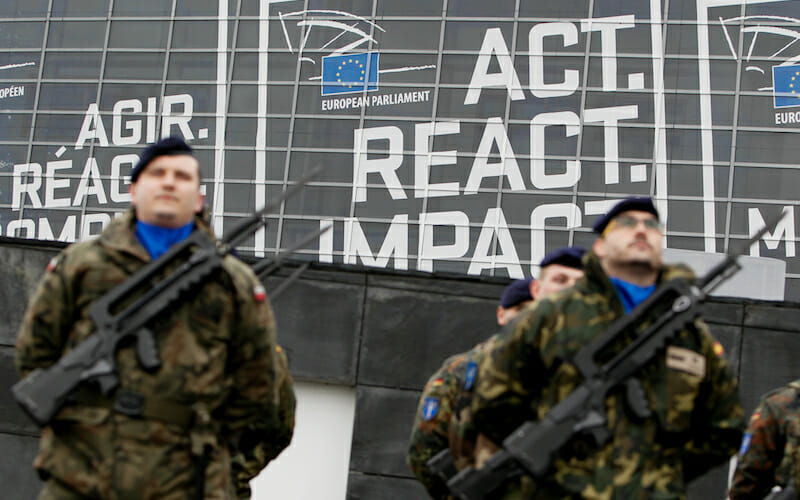
Long Wait to Achieve Common European Security and Defence
On 14-15 February, NATO Defence Ministers will meet in Brussels to discuss amongst other things, security. NATO consists of 29 member states and 22 of them are also EU member states. In general, the decisions taken by NATO are binding on the EU. Quite often, NATO, the US, and Europe, very often have different goals. Their interests and even views on the ways to achieve security are not always the same. Differences exist within the EU as well.
European military ambitions have grown significantly in recent times. The decision to establish a European Union defence pact, known as Permanent Structured Cooperation on security and defence (PESCO) at the end of the previous year became a clear indicator of this trend. It is the first real attempt to form an EU independent defence without reliance on NATO.
Though the EU member states actively support the idea of closer European cooperation in security and defence, they do not always agree on the European Union’s work in this area. In reality not all the states are ready to spend more on defence even in the framework of NATO, which requires spending at least 2 percent of their GDP. Thus, according to NATO’s own figures, only the US (not an EU member state), Great Britain (leaving the EU), Greece, Estonia, Poland and Romania in 2017 met that requirement.
Other countries probably would like to bolster their defence budgets but are not capable or even do not want to pay additional money for a new EU military project. It should be noted that only those countries that have a great dependence on NATO support and have no chance to protect themselves, spend 2 percent of their GDP on defence or show readiness to increase spending (Latvia, Lithuania).
Such EU member states as France and Germany are ready to “lead the process” without increasing in contributions. They have higher levels of strategic independence than the Baltic States or other countries of Eastern Europe.
For example, the French military-industrial complex is capable of producing all kinds of modern weapons – from infantry weapons to ballistic missiles, nuclear submarines, aircraft carriers and supersonic aircraft. In addition, Paris maintains stable diplomatic relations with the Middle East and African States. France also has the reputation of a long-standing partner of Russia and is able to find a common language with Moscow in crisis situations.
France recently presented a plan of creating an integrated pan-European rapid reaction force primarily for the use in expeditionary operations to enforce peace in Africa. The military initiative of French President Macron contains 17 points aimed at improving the training of troops of European countries, as well as increasing the degree of combat readiness of its national armed forces. At the same time, the French project will not become a part of existing institutions, but will be implemented in parallel with NATO projects. France intends to persistently “promote” the project among other EU allies.
Other EU member states’ interests are not so global. They form their politics on security and defence in order to strengthen the EU capabilities to protect themselves and attract attention to their own shortcomings. They offer nothing but few troops. Their interests do not extend beyond their own borders.
EU leadership and member states have not yet reached an agreement on the concept of military integration, the start of which occurred since the adoption of the decision to establish a Permanent Structured Cooperation on security and defence.
In particular, the High Representative of the European Union for Foreign Affairs, Federica Mogherini, proposes a long-term approach to stimulating a closer integration of European military planning, procurement and deployment, as well as the integration of diplomatic and defence functions. Such a slow approach is more comfortable for NATO officials, who are alarmed by the French project.
That is why Secretary General Stoltenberg warned his French counterparts against rash steps toward European military integration, which could lead in his mind to unnecessary duplication of the alliance’s capabilities and, most dangerous, generate competition between the leading weapon manufacturers while re-equipping the European army with updated equipment to bring them to the same standards.
Thus, while supporting the idea of closer cooperation in the military sphere the EU member states have no common strategy. It will take a long time to come to a compromise and balance in creating a strong EU defence system, which will complement the existing NATO structure and will not collide with it. Europe has a way to go before they have a unified European defence

